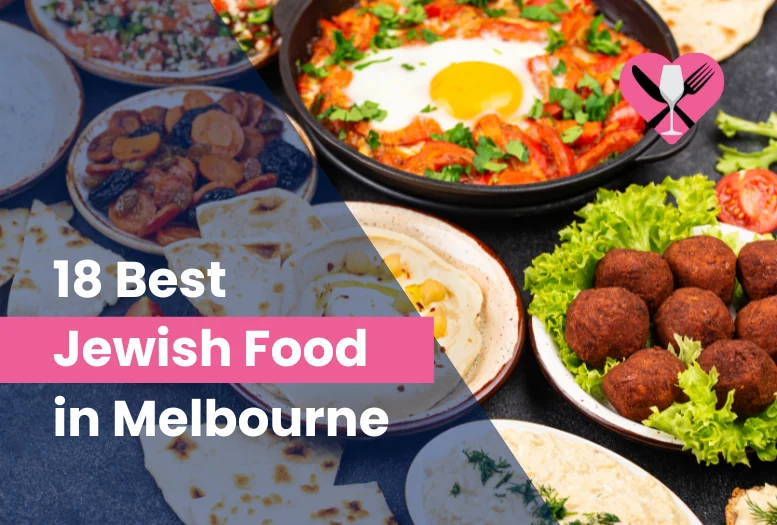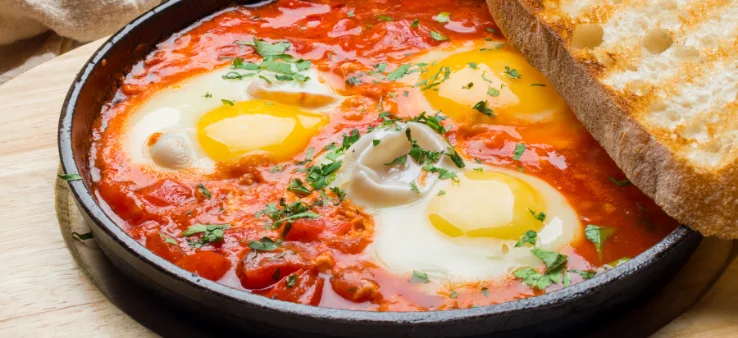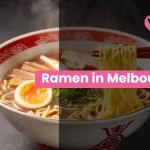Discovering the best Jewish foods in Melbourne is like embarking on a culinary journey through time and tradition. From the aromatic warmth of freshly baked challah bread to the comforting embrace of matzo ball soup, each dish tells a story of heritage and resilience. Delight in the crispy perfection of latkes, the tender richness of brisket, or the sweet indulgence of rugelach. Whether enjoyed during festive celebrations or everyday gatherings, these iconic dishes are a testament to the enduring legacy of Jewish cuisine. Here are 18 Jewish dishes you must try in Melbourne:
The Best Jewish Food in Melbourne
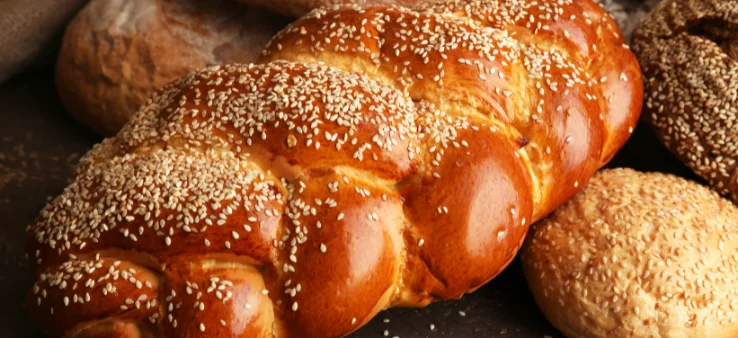
1. Challah Bread:
Picture a golden-brown loaf, intricately braided and glazed to perfection. Challah bread is a staple of Jewish cuisine, cherished for its rich, eggy flavour and soft, pillowy texture. It’s often enjoyed on special occasions like Shabbat and holidays, symbolising unity and abundance.
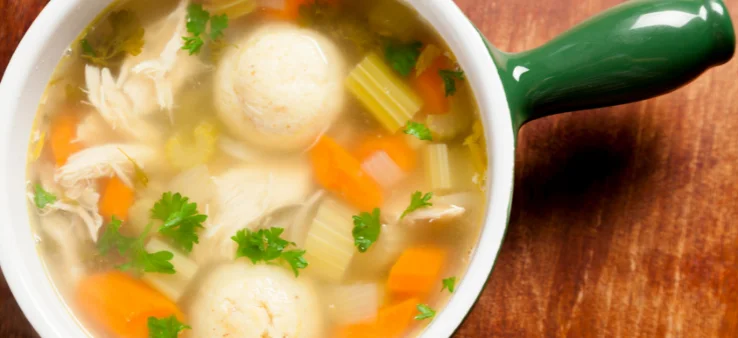
2. Matzo Ball Soup:
Imagine a steaming bowl of clear broth filled with fluffy matzo balls, each one a comforting blend of matzo meal, eggs, and sometimes a touch of schmaltz (rendered chicken fat). The broth itself is nourishing, often infused with the flavours of chicken, vegetables, and aromatic herbs.
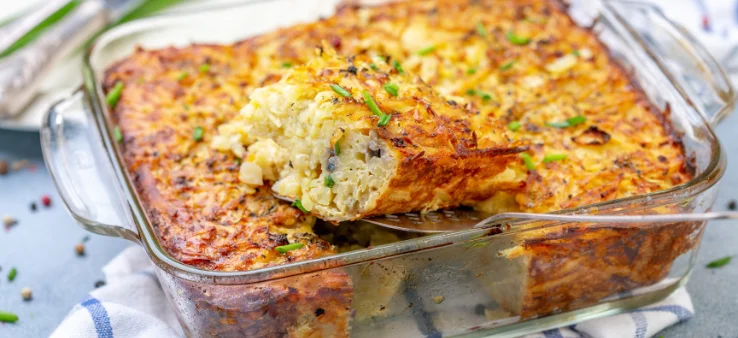
3. Kugel:
Kugel is like a warm hug in the form of a casserole. It can be sweet or savoury, baked to a golden crispness on the outside while remaining moist and tender within. Sweet kugel might feature noodles, raisins, and a custard-like base, while savoury versions often include potatoes, onions, and spices.
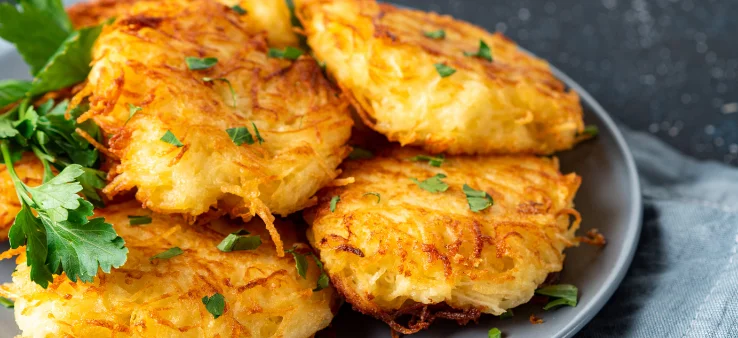
4. Latkes:
Crispy on the outside, tender on the inside – that’s the magic of latkes. These potato pancakes are a Hanukkah favourite, symbolising the miracle of the oil. Grated potatoes are mixed with onions, eggs, and flour, and then fried until they achieve a delightful golden hue. Served with applesauce or sour cream, they’re an irresistible treat. That is why they are one of the famous foods in Melbourne.
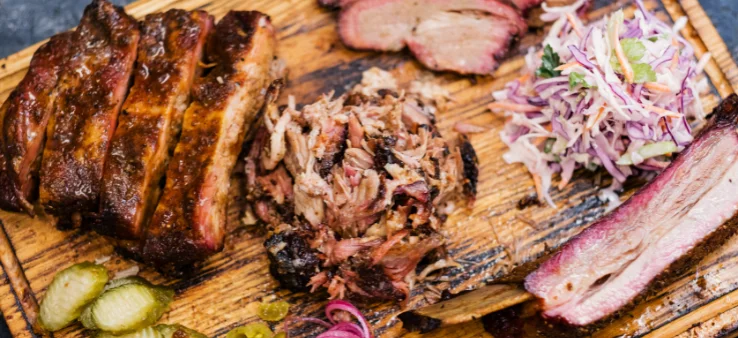
5. Brisket:
Picture succulent slices of beef, slow-cooked to perfection until they practically melt in your mouth. Brisket is a beloved main course in Jewish cuisine, often seasoned with a flavorful rub or marinade before being braised or roasted until tender. It’s a dish that’s both comforting and celebratory, perfect for sharing with loved ones.
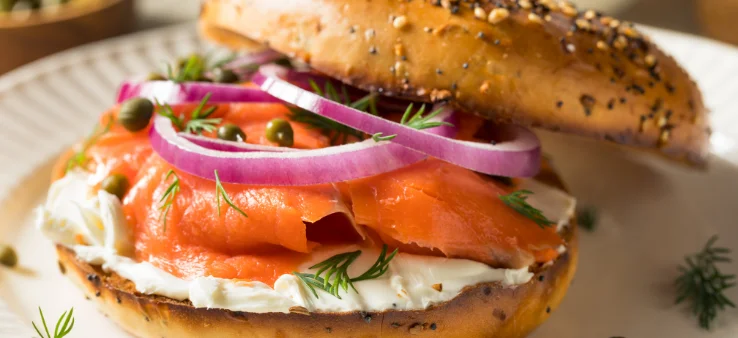
6. Bagels with Lox:
Bagels with Lox is a must-try Jewish food in Melbourne if you have not already. Think of a chewy, doughy bagel, generously topped with cream cheese and adorned with thin slices of silky-smooth smoked salmon, known as lox. Add a pop of colour and flavour with some thinly sliced red onions, briny capers, and perhaps a sprig of fresh dill. It’s a classic combination that’s hard to resist.
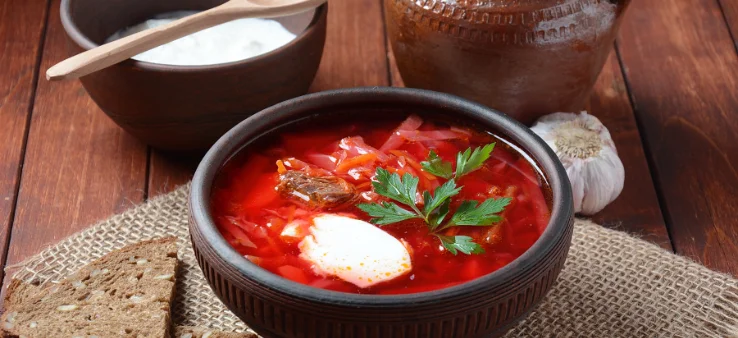
7. Borscht:
Vibrant and full of flavour, borscht is a beet-based soup that’s as nourishing as it is beautiful. It can be served hot or cold, depending on preference, and is often enhanced with other vegetables like cabbage, carrots, and potatoes. A dollop of sour cream adds a creamy richness, while fresh dill provides a burst of freshness.
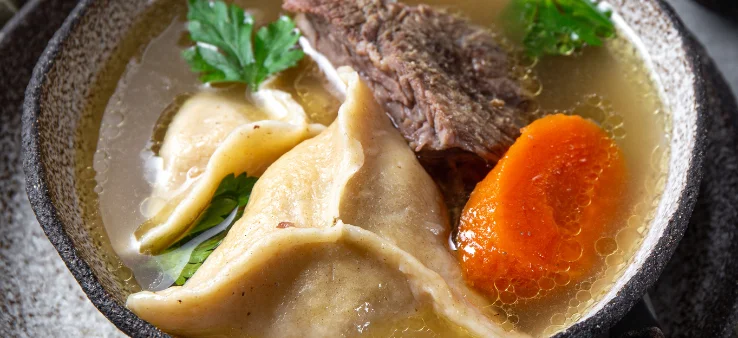
8. Kreplach:
These little pockets of goodness are like Jewish dumplings, filled with a savoury mixture of ground meat, mashed potatoes, or cheese. They can be boiled and served in soup for a comforting meal or fried until crispy for a delicious appetiser or side dish. Either way, they’re sure to satisfy.

9. Rugelach:
Imagine a flaky pastry, rolled up with a sweet filling that’s bursting with flavour. Rugelach fits the bill perfectly, with a buttery dough wrapped around fillings like fruit preserves, chocolate, nuts, or cinnamon sugar. Each bite is a delightful balance of richness and sweetness.
10. Shakshuka:
Originating from North Africa but embraced by Jewish cuisine, shakshuka is a dish of poached eggs nestled in a savoury tomato and pepper sauce. It’s a feast for the senses, with layers of flavour from garlic, onions, and spices like cumin and paprika. Served with crusty bread for dipping, it’s a meal that’s both comforting and exotic.
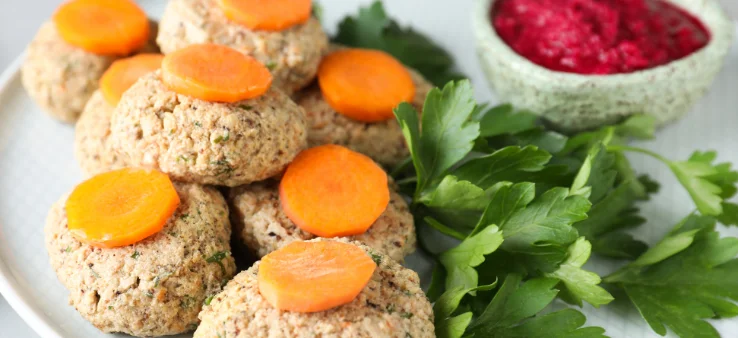
11. Gefilte Fish:
This Jewish dish consists of ground fish, typically carp, whitefish, or pike, mixed with eggs, onions, and seasoning, then formed into patties or balls and poached in a savoury broth. Often served cold with horseradish, it’s a traditional appetiser enjoyed on Jewish holidays.
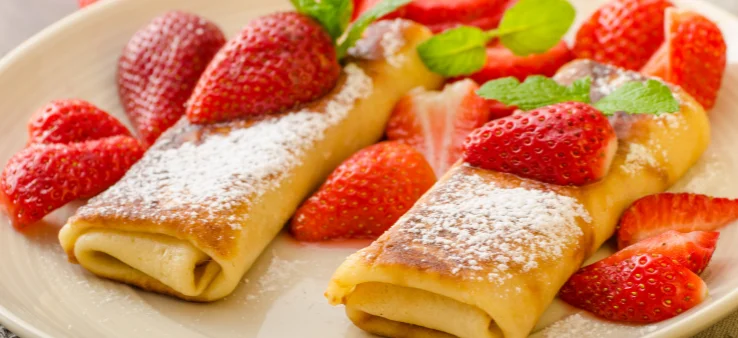
12. Blintzes:
These thin, crepe-like pancakes are filled with sweetened cheese, fruit, or jam, then folded and either baked or fried until golden. Served with sour cream, yoghurt, or a dusting of powdered sugar, they make for a delightful breakfast or dessert.
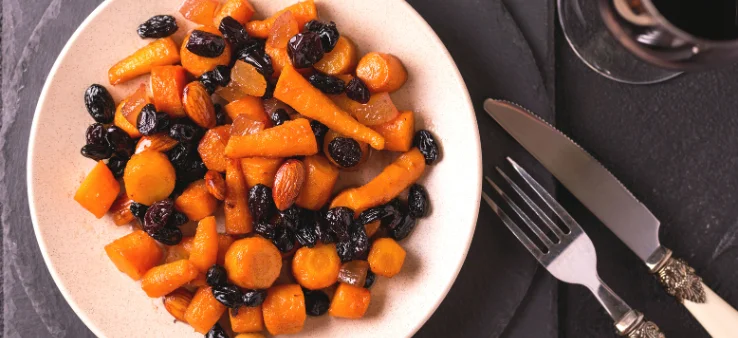
13. Tzimmes:
A sweet and savoury stew made from carrots, sweet potatoes, and dried fruits like prunes or apricots, simmered with honey, cinnamon, and sometimes brisket or flanken. Tzimmes is often enjoyed as a side dish during Rosh Hashanah or Passover.
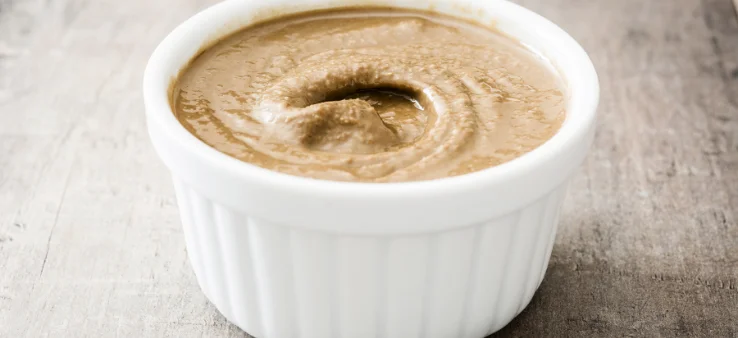
14. Schmaltz:
This rendered chicken fat adds rich flavour to many Jewish dishes, from matzo balls to chopped liver. It’s also used as a cooking fat for frying and sautéing, lending a deep, savoury taste to traditional Jewish recipes.
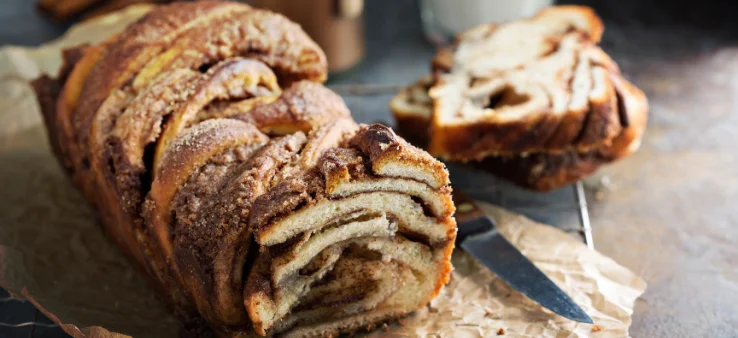
15. Babka:
A sweet, yeast-risen bread swirled with layers of chocolate or cinnamon sugar, babka is a beloved treat often enjoyed on special occasions like Shabbat or Hanukkah. This Jewish food in Melbourne boasts a tender crumb and decadent filling that are simply irresistible, offering a culinary experience like no other.

16. Sufganiyot:
These deep-fried jelly doughnuts are a Hanukkah tradition, symbolising the miracle of the oil. They’re typically filled with raspberry or strawberry jam and dusted with powdered sugar, making them a sweet and indulgent treat.
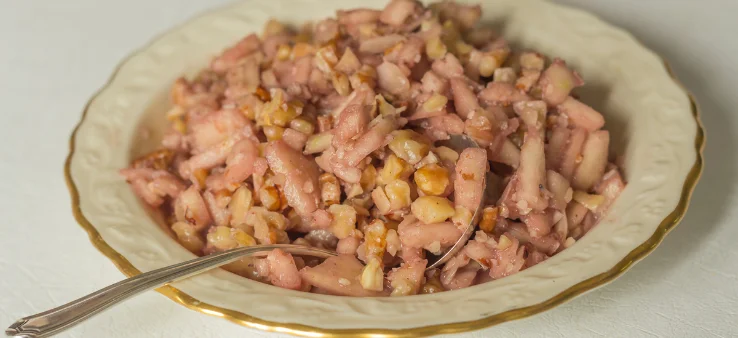
17. Charoset:
A symbolic dish served during Passover, charoset represents the mortar used by the Israelites when they were slaves in Egypt. It’s made from a mixture of chopped apples, nuts, wine, and spices, with variations depending on regional customs.
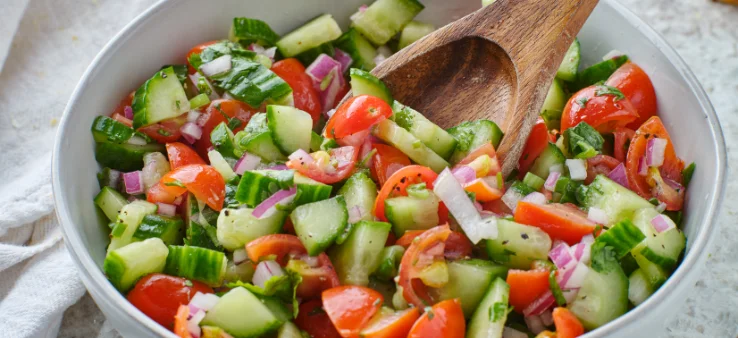
18. Israeli Salad:
A refreshing and vibrant salad made from diced cucumbers, tomatoes, bell peppers, onions, and fresh herbs, dressed simply with olive oil, lemon juice, salt, and pepper. Israeli salad is a staple of Israeli cuisine and a perfect accompaniment to any meal.
Bonus Content: French Food in Sydney
Where Can You Find Jewish Food in Melbourne
In Melbourne, you can find Jewish food in several suburbs, with a notable concentration in areas where Jewish communities have historically settled. Some of the suburbs known for their Jewish food offerings include:
Caulfield: Located in the southeast of Melbourne, Caulfield has a significant Jewish population and is home to various Jewish bakeries, delis, and restaurants offering traditional Jewish cuisine.
St Kilda: This vibrant beachside suburb is known for its eclectic dining scene, including Jewish delis and cafes serving up classic Jewish dishes like bagels, smoked salmon, and matzo ball soup.
Balaclava: Situated adjacent to Caulfield, Balaclava is another suburb with a strong Jewish presence and a variety of kosher eateries offering authentic Jewish fare.
Elsternwick: Like Caulfield and Balaclava, Elsternwick is home to a significant Jewish community and boasts a range of Jewish bakeries, delis, and restaurants specialising in traditional Jewish cuisine.
These suburbs offer a taste of Jewish culture and culinary traditions, with plenty of options for those seeking authentic Jewish food experiences in Melbourne.
Jewish Food History, Culture & Key Elements
Jewish food encompasses a diverse range of culinary traditions that have developed over centuries within Jewish communities around the world. The cuisine is influenced by the dietary laws (kashrut) and cultural practices of Judaism. That as well as the regional cuisines of the countries where Jewish communities have lived.
Some key elements and characteristics of Jewish food include:
Kosher Dietary Laws: Observant Jews adhere to dietary laws outlined in the Torah, which dictate what foods are permissible (kosher) and what foods are not (non-kosher or treif). For example, kosher laws prohibit the consumption of certain animals (such as pork and shellfish), require the separation of meat and dairy products, and specify methods of animal slaughter and food preparation.
Cultural Diversity: Jewish cuisine is incredibly diverse, reflecting the culinary influences of various regions where Jewish communities have settled throughout history. As a result, Jewish food can include elements of Middle Eastern, Mediterranean, Eastern European, North African, and Sephardic cuisines, among others.
Holiday and Ritual Foods: Many Jewish holidays and religious rituals are accompanied by specific foods and dishes. For example, challah bread is traditionally eaten on Shabbat and holidays, matzo ball soup is a staple of Passover seders, and latkes are enjoyed during Hanukkah.
Comfort Foods and Family Recipes: Jewish cuisine often emphasises comfort foods and dishes that are enjoyed in familial and communal settings. These may include hearty stews, braised meats, savoury pastries, and baked goods that have been passed down through generations.
Preservation of Culinary Traditions: Jewish food culture places a strong emphasis on preserving culinary traditions and recipes, often with a focus on homemade and from-scratch cooking. Many Jewish families have treasured recipes that have been handed down for generations, contributing to the richness and diversity of Jewish cuisine.
FAQs:
What are Famous Jewish Foods?
Jewish cuisine boasts a rich tapestry of iconic dishes, each steeped in tradition and flavour. Here are the top 5 famous Jewish Foods in Melbourne:
- Matzo Ball Soup
- Gefilte Fish
- Shakshuka
- Bagels with Lox
- Borscht
Is Jewish Food Healthy?
The healthfulness of Jewish cuisine is as varied as its flavours, with a spectrum of dishes spanning from indulgent to nutritious. While some traditional favourites may be rich or calorie-dense, others showcase wholesome ingredients and balanced flavours. Through mindful choices and adaptations, Jewish cuisine can align with modern dietary preferences and nutritional goals.
Read More:

